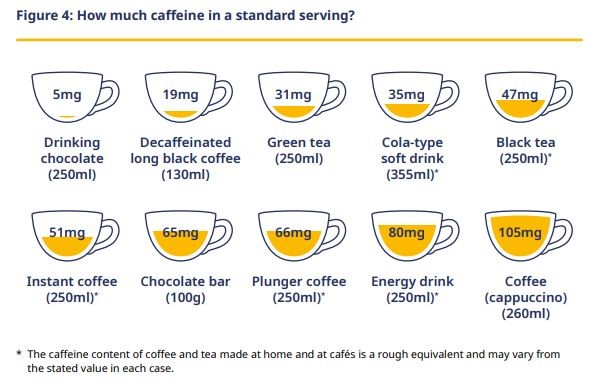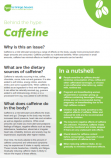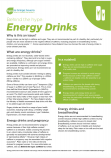The effects from caffeine are felt within 5–30 minutes of having it and can last for 4–6 hours.
Research suggests 400 mg per day is acceptable for most people, but it does depend on your body size and metabolism. The Ministry of Health recommends having no more than 7 cups of tea or instant coffee per day or 3 single shot espresso coffees per day.

Image credit: MOH, Eating and Activity Guidelines for Adults, 2020
It's important to know that caffeine content can vary considerably depending on how it's brewed, eg, cold brew coffee can contain a lot more caffeine than brewed (filter or percolated) coffee. This is because in cold brew, coffee grounds are steeped in water for around 8-24 hours.
Other factors that can affect the amount of caffeine in a cup of coffee include:
- the type of roast, eg, robusta coffee beans may contain twice as much caffeine as arabica
- the amount of ground coffee used during the brewing process
- the serving size.
Pregnant and breastfeeding women, children and athletes
Pregnant women – it’s recommended that you limit caffeine intake to below 200 mg per day during pregnancy and that you avoid energy drinks. Having large amounts of caffeine during pregnancy may increase the risk of miscarriage, stillbirth and having a baby with low birthweight. 200 mg of caffeine is found in 4 cups of tea or 1 espresso.
Breastfeeding women – can drink caffeine in moderation. Some babies may be sensitive and a large amount can cause your baby to be stimulated or have poor sleep. It’s recommended that you limit your caffeine to no more than 6 cups of tea or instant coffee (or 3 single shot espressos) per day.
Children – it’s recommended that children/tamariki are not given tea, coffee or energy drinks as it can affect their sleep or lead to dehydration.
Athletes – some studies suggest caffeine ingestion prior to exercise can improve performance and focus for athletes. Consult with your GP if you're taking caffeine supplements regularly, do not exceed the recommended limit of 40 mg per day and be aware of the side effects.








